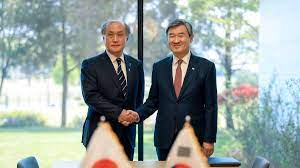William Gallo
When it comes to his country’s ties with Japan, South Korean President Yoon Suk Yeol wants to look to the future. But if South Korean public reaction is any indication, that may be difficult without further moves by Japan to address the past.
Yoon in March took unilateral steps to improve relations between South Korea and Japan, which had sunk to their lowest point in decades over a dispute related to Japan’s use of forced labor during its brutal 1910-1945 occupation of the Korean Peninsula. Under a proposal unveiled by Yoon, Korean forced labor victims will receive compensation via a private foundation. Crucially, the foundation will be funded by South Korean companies, rather than Japanese businesses, as mandated by a 2018 ruling by South Korea’s Supreme Court.
Japan welcomed the move; so did the United States, which has long urged the two countries to resolve their differences and work together on shared challenges, such as North Korea and China. But the reaction was much harsher in Seoul. About 60% of South Koreans oppose Yoon’s Japan approach, opinion polls suggest. Many forced labor victims and their families, as well as the country’s liberal opposition, accuse Yoon of diplomatic surrender, saying he should instead demand reparations and an apology from Japan.
Such touchy historical issues are likely to come up during Japanese Prime Minister Fumio Kishida’s two-day visit to Seoul, which begins Sunday. But Tokyo has given no indication it will make any concessions on the forced labor issue, raising questions about whether Yoon’s outreach will outlast his presidency. “I’m very doubtful,” said Moon Chung-in, a Seoul-based international relations scholar and former adviser to multiple left-leaning South Korean governments. “Because President Yoon has not really built up the national consensus to conduct this diplomatic initiative toward Japan.” Kishida’s stop in Seoul – the first by a Japanese prime minister in five years – follows Yoon’s visit to Tokyo in March.
During that visit, the two leaders announced a series of measures aimed at improving cooperation on trade, security, and diplomacy. Similar steps may be announced during Kishida’s visit. But without progress on sensitive historical issues, many analysts warn it may be impossible to place Yoon’s outreach on a more stable footing at home. “What is somewhat frustrating … is actually how little Kishida would have to do to put a solid floor under these attempts to improve relations,” said Daniel Sneider, lecturer of international policy at Stanford University. “That starts with whatever language he uses when he’s in Seoul to talk about the past.”
During Yoon’s visit to Tokyo, Kishida did not offer a new apology for Japan’s wartime history. Instead, he reaffirmed that Tokyo upholds the position of previous governments, including a 1998 declaration that included an apology. That was not nearly enough for many South Koreans – including even some of Yoon’s conservative allies, who had urged Kishida to express his own heartfelt remorse. “To use his own words – to speak with some degree of individual sincerity and responsibility about the past – I think that can make a big difference,” Sneider said.
Many South Koreans hope Kishida will also encourage, or at least speak positively about, the idea of Japanese companies contributing to the South Korean forced labor fund. But none of that is likely, says Tetsuo Kotani, senior fellow at the Japan Institute of International Affairs. “Prime Minister Kishida repeated our past statements on history, and this is the maximum that a current Japanese political leader can do,” Kotani said. “If any Japanese prime minister says something beyond that, then Japanese conservative politicians could make a lot of noise.”
Many Japanese conservatives doubt Yoon can deliver on his promise to improve relations. In the past, conservative South Korean presidents have attempted to strengthen ties, only to criticize Japan once their approval ratings sank, said Kotani. Just one year into his single, five-year presidential term, Yoon’s approval rating is already very low and South Korea’s liberal opposition dominates the country’s legislature. If his political fate worsens, Japanese conservatives fear Yoon will “play the Japan card” and try to exploit historical grievances, Kotani said. Japan insists the forced labor and all other compensation issues were resolved by a 1965 treaty that established bilateral relations and offered South Korea economic help. Additionally, multiple Japanese governments have issued apologies. The extent of Japan’s colonial abuses, however, was only discovered decades later in some cases, leading to a wave of South Korean demands for individual compensation.
Additionally, many South Koreans say that Japan’s apologies were insincere, given later attempts by prominent Japanese conservatives to deny or downplay colonial-era atrocities. Though Yoon faces enormous political pressure to take a tougher stance on Japan, so far there are no signs he will give in. During his Tokyo summit, Yoon said he has no plans to seek reimbursement from Japan after compensating forced labor victims.
In an interview with The Washington Post last month, Yoon said he cannot accept the notion that Japan “must kneel [for forgiveness] because of our history 100 years ago.” Instead, Yoon has argued, “future-oriented” cooperation with Japan is necessary to preserve freedom, peace and prosperity in northeast Asia. But even if Koreans agree with Yoon on the need for a closer strategic relationship with Japan, they are not ready “to just throw the past aside,” according to Sneider, who urges Kishida to use the upcoming visit to take a conciliatory approach to historical issues. “This is not hard to do. Not hard. And it’s the right thing to do,” Sneider said. “It’s the morally, politically, geo-strategically right thing to do.”
VOA







